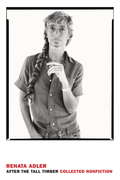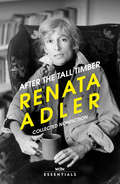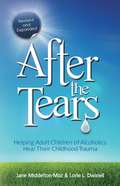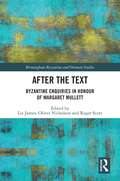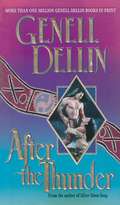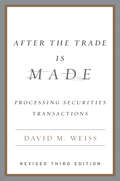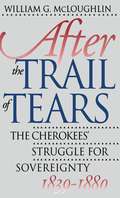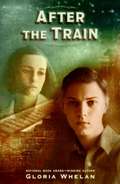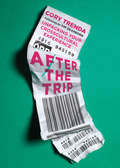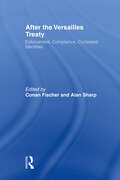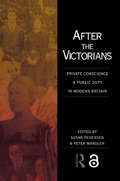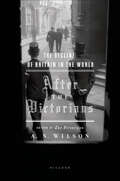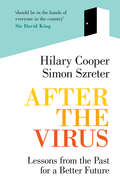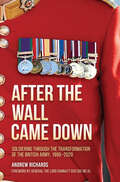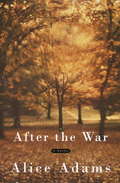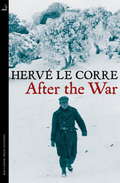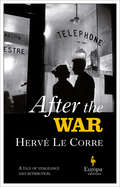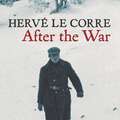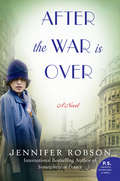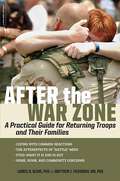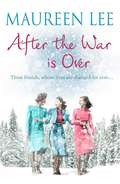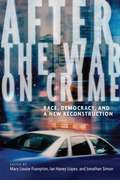- Table View
- List View
After the Tall Timber
by Michael Wolff Renata AdlerWhat is really going on here? For decades Renata Adler has been asking and answering this question with unmatched urgency. In her essays and long-form journalism, she has captured the cultural zeitgeist, distrusted the accepted wisdom, and written stories that would otherwise go untold. As a staff writer at The New Yorker from 1963 to 2001, Adler reported on civil rights from Selma, Alabama; on the war in Biafra, the Six-Day War, and the Vietnam War; on the Nixon impeachment inquiry and Congress; on cultural life in Cuba. She has also written about cultural matters in the United States, films (as chief film critic for The New York Times), books, politics, television, and pop music. Like many journalists, she has put herself in harm's way in order to give us the news, not the "news" we have become accustomed to--celebrity journalism, conventional wisdom, received ideas--but the actual story, an account unfettered by ideology or consensus. She has been unafraid to speak up when too many other writers have joined the pack. In this sense, Adler is one of the few independent journalists writing in America today.This collection of Adler's nonfiction draws on Toward a Radical Middle (a selection of her earliest New Yorker pieces), A Year in the Dark (her film reviews), and Canaries in the Mineshaft (a selection of essays on politics and media), and also includes uncollected work from the past two decades. The more recent pieces are concerned with, in her words, "misrepresentation, coercion, and abuse of public process, and, to a degree, the journalist's role in it." With a brilliant literary and legal mind, Adler parses power by analyzing language: the language of courts, of journalists, of political figures, of the man on the street. In doing so, she unravels the tangled narratives that pass for the resolution of scandal and finds the threads that others miss, the ones that explain what really is going on here--from the Watergate scandal, to the "preposterous" Kenneth Starr report submitted to the House during the Clinton impeachment inquiry, to the plagiarism and fabrication scandal of the former New York Times reporter Jayson Blair. And she writes extensively about the Supreme Court and the power of its rulings, including its fateful decision in Bush v. Gore.
After the Tall Timber (W&N Essentials)
by Renata AdlerIn these 21 essays of nonfiction Adler draws on Toward a Radical Middle (a selection of her earliest New Yorker pieces), A Year in the Dark (her film reviews), and Canaries in the Mineshaft (a selection of essays on politics and media), and also includes uncollected work from the past two decades. Adler is first and foremost a journalist, and positions herself as a centrist. The pieces are concerned with, in her words, misrepresentation, coercion, and abuse of public process, and, to a degree, the journalist's role in it. With a brilliant literary and legal mind, Adler parses power by analyzing language: the language of courts, of journalists, of political figures, of the man on the street. In doing so, she unravels the tangled narratives that pass for the resolution of scandal and finds the threads that others miss. Adler delves into the ones that explain what really is going on here from the Watergate scandal, to the preposterous Kenneth Starr report submitted to the House during the Clinton impeachment inquiry, to the plagiarism and fabrication scandal of the former New York Times reporter Jayson Blair. And she writes extensively about the Supreme Court and the power of its rulings, including its fateful decision in Bush v. Gore.
After the Tears: Helping Adult Children of Alcoholics Heal Their Childhood Trauma
by Jane Middelton-Moz Lorie DwinellAdult children of alcoholics have learned how to "survive," but often have difficulty "living" their lives. The trauma and grief of childhood losses affect every aspect of the life of an adult child of an alcoholic (ACoA). Now the authors of the bestselling After the Tears offer further insight into the origin and cost of childhood pain for those who grew up in alcoholic families. In this revised and expanded edition, Jane Middelton-Moz and Lorie Dwinell combine their years of experience in working with ACoAs, tackling issues such as intimacy, sibling relationships, codependency, breaking the alcoholic pattern, building a relationship with the inner child, forgiveness, and opening a window to spirituality.
After the Text: Byzantine Enquiries in Honour of Margaret Mullett (Birmingham Byzantine and Ottoman Studies #32)
by Liz JamesAfter the Text honours the work of renowned historian Margaret Mullett, who since the 1970s has transformed the study of Byzantine literature. Her work has been influential in demonstrating the strength and variety of Byzantine texts. Byzantium is renowned for its achievements in architecture and the visual arts. Professor Mullett's perceptive studies, produced over more than 40 years, have shown that the literature of the Byzantine Empire is of equal beauty and interest, ranging, as it does, from high-style poetry and rhetoric in the classical manner through letters to demotic writings such as fables and the lives of saints. The collection of essays in this volume draws further attention to the wealth and diversity of Byzantine texts, by exploring the Greek literature of Late Antiquity and the Middle Ages in all its variety. These studies, by going, like Professor Mullett herself, beyond the texts, illustrate the value of Byzantine literature for interpreting Byzantine history and civilisation in all its richness. This book is crucial reading for scholars and students of the Byzantine world, as well as for those interested in literary studies.
After the Thunder
by Genell DellinCotannah Chisk-Ko is ordered by her brother to return to the Nation to learn to behave like a proper young woman, but she continues her outrageous flirting and is attacked. Rescued by quiet, spiritual, Walks-With-Spirits, she finds an inner serenity with this man, and when he is unjustly accused of murder, she devotes herself to proving him innocent. Despite their differences, the two are irresistibly drawn to one another, and discover they are truly soulmates.
After the Trade Is Made, Revised Ed.
by David M. WeissThe fully updated classic guide to the mechanics of securities processing--a must for professional investors This third edition of After the Trade Is Made reflects the changes that have taken place in recent years as a result of new products, technological breakthroughs, and the globalization of the securities industry. Comprehensive and easy to understand, it provides brokers, operations personnel, and individual investors with definitive and up-to-the-minute explanations of each step in the trading process--from the moment a customer decides to buy or sell a security through the final requirements of record keeping. Written for both securities professionals and individual investors, whether domestic or in other countries, this new edition clearly explains the core of underwritings, new and established trading markets, transaction processing, margin, and more--while providing critical insights into the most recent wave of industry changes. David M. Weiss, a veteran securities professional, traces the entire process of buying or selling a security, from order management to transaction processing to the final posting on the firm's books and records. He covers the specialized attributes of each function in a typical brokerage firm, as well as their relationships with commercial banks, transfer agents, clearing corporations, and depositories. After the Trade Is Made is the definitive resource for anyone eager to understand and confidently navigate the vast and often surprising world of securities.
After the Trail of Tears
by William G. McloughlinThis powerful narrative traces the social, cultural, and political history of the Cherokee Nation during the forty-year period after its members were forcibly removed from the southern Appalachians and resettled in what is now Oklahoma. In this master work, completed just before his death, William McLoughlin not only explains how the Cherokees rebuilt their lives and society, but also recounts their fight to govern themselves as a separate nation within the borders of the United States. Long regarded by whites as one of the 'civilized' tribes, the Cherokees had their own constitution (modeled after that of the United States), elected officials, and legal system. Once re-settled, they attempted to reestablish these institutions and continued their long struggle for self-government under their own laws--an idea that met with bitter opposition from frontier politicians, settlers, ranchers, and business leaders. After an extremely divisive fight within their own nation during the Civil War, Cherokees faced internal political conflicts as well as the destructive impact of an influx of new settlers and the expansion of the railroad. McLoughlin brings the story up to 1880, when the nation's fight for the right to govern itself ended in defeat at the hands of Congress.
After the Train
by Gloria WhelanPeter Liebig can't wait for summer. He's tired of classrooms, teachers, and the endless lectures about the horrible Nazis. The war has been over for ten years, and besides, his town of Rolfen, West Germany, has moved on nicely. Despite its bombed-out church, it looks just as calm and pretty as ever. There is money to be made at the beach, and there are whole days to spend with Father at his job. And, of course, there's soccer. Plenty for a thirteen-year-old boy to look forward to. But when Peter stumbles across a letter he was never meant to see, he unravels a troubling secret. Soon he questions everything-the town's peaceful nature, his parents' stories about the war, and his own sense of belonging.
After the Trip: Unpacking Your Crosscultural Experience
by Cory Trenda Tim DearbornVeteran trip leader and intercultural guide Cory Trenda says yes—if we let the trip launch a journey of integrating the experience into our ongoing life. In After the Trip Trenda provides a unique guide for individuals and teams to make the most of a crosscultural trip after returning home. Readers will find help with navigating the crucial reentry process, remembering and sharing key stories, interweaving new insights into everyday life, and engaging in continuing learning and service. Combining practical tips, reflections, and stories from Trenda's own decades of crosscultural travel, this is an essential resource for organizations, churches, schools, and all travelers who want crosscultural trips to be a catalyst for lasting good. The trip itself is just the beginning; real life change happens after the trip.
After the Versailles Treaty: Enforcement, Compliance, Contested Identities
by Conan Fischer Alan SharpDesigned to secure a lasting peace between the Allies and Germany, the Versailles Settlement soon came apart at the seams. In After The Versailles Treaty an international team of historians examines the almost insuperable challenges facing victors and vanquished alike after the ravages of WW1. This is not another diplomatic history, instead focusing on the practicalities of treaty enforcement and compliance as western Germany came under Allied occupation and as the reparations bill was presented to the defeated and bankrupt Germans. It covers issues such as: How did the Allied occupiers conduct themselves and how did the Germans respond? Were reparations really affordable and how did the reparations regime affect ordinary Germans? What lessons did post-WW2 policymakers learn from this earlier reparations settlement The fraught debates over disarmament as German big business struggled to adjust to the sudden disappearance of arms contracts and efforts were made on the international stage to achieve a measure of global disarmament. The price exacted by the redrawing of frontiers on Germany’s eastern and western margins, as well as the (gentler) impact of the peace settlement on identity in French Flanders. This book was previously published as a special issue of Diplomacy and Statecraft
After the Victorians: Private Conscience and Public Duty in Modern Britain
by Susan Pedersen Peter MandlerWritten by a team of eminent historians, these essays explore how ten twentieth-century intellectuals and social reformers sought to adapt such familiar Victorian values as `civilisation', `domesticity', `conscience' and `improvement' to modern conditions of democracy, feminism and mass culture. Covering such figures as J.M. Keynes, E.M. Forster and Lord Reith of the BBC, these interdisciplinary studies scrutinize the children of the Victorians at a time when their private assumptions and public positions were under increasing strain in a rapidly changing world. After the Victorians is written in honour of the late Professor John Clive of Harvard, and uses, as he did, the method of biography to connnect the public and private lives of the generations who came after the Victorians.
After the Victorians: The Decline of Britain in the World
by A. N. WilsonThe distinguished historian A.N. Wilson has charted, in vivid detail, Britain's rise to world dominance, a tale of how one small island nation came to be the mightiest, richest country on earth, reigning over much of the globe. Now in his much anticipated sequel to the classic The Victorians, he describes how in little more than a generation Britain's power and influence in the world would virtually dissolve. In After the Victorians, Wilson presents a panoramic view of an era, stretching from the death of Queen Victoria in 1901 to the dawn of the cold war in the early 1950s. He offers riveting accounts of the savagery of World War I and the world-altering upheaval of the Communist Revolution. He explains Britain's role in shaping the destiny of the Middle East. And he casts a bright new light on the World War II years: Britain played a central role in defeating Germany but at a severe cost. The nation would emerge from the war bankrupt and fatally weakened, sidelined from world politics, while America would assume the mantle of dominant world power, facing off against the Soviet Union in the cold war. Wilson's perspective is not confined to the trenches of the battlefield and the halls of parliament: he also examines the parallel story of the beginnings of Modernism-he visits the novelists, philosophers, poets, and painters to see what they reveal about the activities of the politicians, scientists, and generals.Blending military, political, social, and cultural history of the most dramatic kind, A.N. Wilson offers an absorbing portrait of the decline of one of the world's great powers. The result is a fresh account of the birth pangs of the modern world, as well as a timely analysis of imperialism and its discontents.
After the Virus: Lessons from the Past for a Better Future
by Simon Szreter Hilary CooperWhy was the UK so unprepared for the pandemic, suffering one of the highest death rates and worst economic contractions of the major world economies in 2020? Hilary Cooper and Simon Szreter reveal the deep roots of our vulnerability and set out a powerful manifesto for change post-Covid-19. They argue that our commitment to a flawed neoliberal model and the associated disinvestment in our social fabric left the UK dangerously exposed and unable to mount an effective response. This is not at all what made Britain great. The long history of the highly innovative universal welfare system established by Elizabeth I facilitated both the industrial revolution and, when revived after 1945, the postwar Golden Age of rising prosperity. Only by learning from that past can we create the fairer, nurturing and empowering society necessary to tackle the global challenges that lie ahead - climate change, biodiversity collapse and global inequality.
After the Wall Came Down: Soldiering through the Transformation of the British Army, 1990–2020
by Andrew RichardsThe generation of young men and women who joined the British Army during the mid to late 1980s would serve their country during an unprecedented period of history. Unlike the two world war generations, they would never face total war – there was never any declaration of war and there was no one single country to defeat. In fact, it was supposed to have been the end of war, a time of peace and stability. Politicians started to use the term, Peace Dividend, with government officials even planning on how and where it should be spent. But for those in the military, the two decades following the end of the Cold War would not be a time of peace. Government spending and the size of the military was reduced but the Army’s commitments increased exponentially. Those serving not only faced continuous deployment in overseas operations, they would also be involved in immense upheavals that took place within the army. When the Berlin Wall came down, the British Army had not changed for decades. The ending of the Cold War, combined with a technological revolution, a changing society at home, and new global threats mean that the Army of the second decade of the twentieth-first century – the army this generation of soldiers is now retiring from – is unrecognizable from the one they joined in the late 1980s. This is the story of the soldiers who served in the British Army in those tumultuous decades.
After the War
by Alice AdamsIn her final novel, published posthumously, Alice Adams returns to the Southern college town of Pinehill, the setting for her acclaimed Southern Exposure. Even after five years in Pinehill, Cynthia Baird is still considered a Yankee. And life has become more difficult since the beginning of the war. With Harry stationed in London, Cynthia finds life in a small town complicated not only be loneliness but also by a growing awareness of local racism and anti-Semitism. Their daughter Abigail is about to return north for college, and the two generations are forced to determine what they cherish and what they must leave behind. And as Abigail heads off to college, where she faces all the traditional complications of youth, we are drawn into an America caught between past and future, and two generations forced to determine what they cherish and what they must leave behind. Alice Adams's depiction of her native South--full, rich, affectionate, and always one of her many strengths--is at its most subtle and engrossing in After the War.
After the War
by Carol MatasAfter being released from Buchenwald at the end of World War II, fifteen-year-old Ruth risks her life to lead a group of children across Europe to Palestine.
After the War
by Sam Taylor Hervé Le Corre1950's Bordeaux. Even now, the Second World War is never far from people's memories, particularly in a city where the scars of collaboration and resistance are more keenly felt than ever. But another war has already begun. A war without a name, far away across the sea, in Algeria, where young men are sent to fight in a brutal conflict.Daniel knows what awaits him. He's heard stories. Patrols, ambushes, reprisals, massacres, mutilations, all beneath a burning north African sun. He has just a month left before he leaves but, haunted by the loss of his parents and sister in the atrocities of the last war, Daniel questions why he is even going to fight in the first place.Meanwhile, past crimes are returning to haunt Albert Darlac, the godfather of Bordeaux: corrupt police chief, fascist sympathiser and one-time collaborator. Before long, a series of explosive events will set off a spiral of violence that will bring the horrific legacy of wars past and present to the streets of Bordeaux.Translated from the French by Sam Taylor
After the War
by Hervé Le CorreA lost young man and a corrupt politician deal with the legacy World War II has left them in this crime novel, by the author of Talking to Ghosts.1950s Bordeaux is a city plagued by memories and scars of the Second World War. Meanwhile, across the sea, another war has already begun. The young men of France are sent in droves to Algeria, where they wage brutal battle in a conflict so new it has yet to be given a name.Albert Darlac, a corrupt police chief, fascist sympathizer, and one-time collaborator, will soon discover that not everybody has forgiven or forgotten his wartime crimes. Twenty-year-old Daniel has heard the stories of massacres and mutilations, of ambushes and patrols played out under a burning north African sun. The atrocious loss of his parents and sister in the war that has just ended haunts him. A series of explosive events will bring the destinies of these two men together in this uncompromising masterpiece set in a world driven by retribution . . .Praise for After the War“Graphic in its violence but rich in history and psychology, this novel is vivid proof that “after the war, sometimes the war continues.” —Kirkus Reviews“The writing of Hervé Le Corre has a musicality that verges on the poetic. He is the perfect portraitist.” —Le Monde (France)“Composed with all the skill of a virtuoso, mingling the colorful slang of bistros and bad guys with sensitive, sharp, crystalline prose that pierces you to the core. Superb.” —Télérama (France)“Full-blooded and uncompromising. Extraordinary.” —L’Express (France)
After the War (MacLehose Press Editions #6)
by Hervé Le Corre1950's Bordeaux. Even now, the Second World War is never far from people's memories, particularly in a city where the scars of collaboration and resistance are more keenly felt than ever. But another war has already begun. A war without a name, far away across the sea, in Algeria, where young men are sent to fight in a brutal conflict.Daniel knows what awaits him. He's heard stories. Patrols, ambushes, reprisals, massacres, mutilations, all beneath a burning north African sun. He has just a month left before he leaves but, haunted by the loss of his parents and sister in the atrocities of the last war, Daniel questions why he is even going to fight in the first place.Meanwhile, past crimes are returning to haunt Albert Darlac, the godfather of Bordeaux: corrupt police chief, fascist sympathiser and one-time collaborator. Before long, a series of explosive events will set off a spiral of violence that will bring the horrific legacy of wars past and present to the streets of Bordeaux.Translated from the French by Sam Taylor
After the War (MacLehose Press Editions #6)
by Hervé Le Corre1950's Bordeaux. Even now, the Second World War is never far from people's memories, particularly in a city where the scars of collaboration and resistance are more keenly felt than ever. But another war has already begun. A war without a name, far away across the sea, in Algeria, where young men are sent to fight in a brutal conflict.Daniel knows what awaits him. He's heard stories. Patrols, ambushes, reprisals, massacres, mutilations, all beneath a burning north African sun. He has just a month left before he leaves but, haunted by the loss of his parents and sister in the atrocities of the last war, Daniel questions why he is even going to fight in the first place.Meanwhile, past crimes are returning to haunt Albert Darlac, the godfather of Bordeaux: corrupt police chief, fascist sympathiser and one-time collaborator. Before long, a series of explosive events will set off a spiral of violence that will bring the horrific legacy of wars past and present to the streets of Bordeaux.Translated from the French by Sam Taylor(P)2017 WF Howes Ltd
After the War Is Over: A Novel
by Jennifer RobsonThe internationally bestselling author of Somewhere in France returns with her sweeping second novel--a tale of class, love, and freedom--in which a young woman must fnd her place in a world forever changedAfter four years as a military nurse, Charlotte Brown is ready to leave behind the devastation of the Great War. The daughter of a vicar, she has always been determined to dedicate her life to helping others. Moving to busy Liverpool, she throws herself into her work with those most in need, only tearing herself away for the lively dinners she enjoys with the women at her boardinghouse.Just as Charlotte begins to settle into her new circumstances, two messages arrive that will change her life. One is from a radical young newspaper editor who offers her a chance to speak out for those who cannot. The other pulls her back to her past, and to a man she has tried, and failed, to forget.Edward Neville-Ashford, her former employer and the brother of Charlotte's dearest friend, is now the new Earl of Cumberland--and a shadow of the man he once was. Yet under his battle wounds and haunted eyes Charlotte sees glimpses of the charming boy who long ago claimed her foolish heart. She wants to help him, but dare she risk her future for a man who can never be hers?As Britain seethes with unrest and postwar euphoria fattens into bitter disappointment, Charlotte must confront long-held insecurities to fnd her true voice . . . and the courage to decide if the life she has created is the one she truly wants.
After the War Zone: A Practical Guide for Returning Troops and Their Families
by Matthew J. Friedman Laurie B. SloneTwo experts from the VA National Center for PTSD provide an essential resource for service members, their spouses, families, and communities, sharing what troops really experience during deployment and back home. Pinpointing the most common after-effects of war and offering strategies for troop reintegration to daily life, Drs. Friedman and Slone cover the myths and realities of homecoming; reconnecting with spouse and family; anger and adrenaline; guilt and moral dilemmas; and PTSD and other mental-health concerns. With a wealth of community and government resources, tips, and suggestions, <i>After the War Zone</i> is a practical guide to helping troops and their families prevent war zone stresses from having a lasting negative impact.
After the War is Over: A heart-warming story from the queen of saga writing
by Maureen LeeA heart-warming tale set in Liverpool and London during the post-war years, from bestselling author Maureen Lee.Liverpool, 1945. Three women, firm friends, return home from the war and try to fit back into their old lives after they've been demobbed. They've been thrown together by the war, and have shared all sorts of good and bad times. Now their old lives seem dull in comparison. But not for long...The younger women, Maggie and Nell, are both twenty-one and are full of hope and excitement; Iris, on the other hand, is feeling apprehensive about returning to civilian life. At the age of thirty,her only wish in life is to have a baby, but sadly this wish has yet to come true.When one of the women falls pregnant, there begins a dramatic sequence of events so far-reaching that the three friends' lives will become more intricately interwoven than they could ever have imagined. Over the next quarter of a century, this story of three remarkable - and very different - women unfolds into an uplifting tale of how three ordinary families become extraordinary.
After the War is Over: A heart-warming story from the queen of saga writing
by Maureen LeeA heart-warming tale set in Liverpool and London during the post-war years, from bestselling author Maureen Lee'Queen of saga writing' My WeeklyLiverpool, 1945. Three women, firm friends, return home from the war and try to fit back into their old lives after they've been demobbed. They've been thrown together by the war, and have shared all sorts of good and bad times. Now their old lives seem dull in comparison. But not for long...The younger women, Maggie and Nell, are both twenty-one and are full of hope and excitement; Iris, on the other hand, is feeling apprehensive about returning to civilian life. At the age of thirty,her only wish in life is to have a baby, but sadly this wish has yet to come true.When one of the women falls pregnant, there begins a dramatic sequence of events so far-reaching that the three friends' lives will become more intricately interwoven than they could ever have imagined. Over the next quarter of a century, this story of three remarkable - and very different - women unfolds into an uplifting tale of how three ordinary families become extraordinary.
After the War on Crime: Race, Democracy, and a New Reconstruction
by Mary Louise Frampton, Ian Haney López, and Jonathan SimonSince the 1970s, Americans have witnessed a pyrrhic war on crime, with sobering numbers at once chilling and cautionary. Our imprisoned population has increased five-fold, with a commensurate spike in fiscal costs that many now see as unsupportable into the future. As American society confronts a multitude of new challenges ranging from terrorism to the disappearance of middle-class jobs to global warming, the war on crime may be up for reconsideration for the first time in a generation or more. Relatively low crime rates indicate that the public mood may be swinging toward declaring victory and moving on.However, to declare that the war is over is dangerous and inaccurate, and After the War on Crime reveals that the impact of this war reaches far beyond statistics; simply moving on is impossible. The war has been most devastating to those affected by increased rates and longer terms of incarceration, but its reach has also reshaped a sweeping range of social institutions, including law enforcement, politics, schooling, healthcare, and social welfare. The war has also profoundly altered conceptions of race and community.It is time to consider the tasks reconstruction must tackle. To do so requires first a critical assessment of how this war has remade our society, and then creative thinking about how government, foundations, communities, and activists should respond. After the War on Crime accelerates this reassessment with original essays by a diverse, interdisciplinary group of scholars as well as policy professionals and community activists. The volume's immediate goal is to spark a fresh conversation about the war on crime and its consequences; its long-term aspiration is to develop a clear understanding of how we got here and of where we should go.
